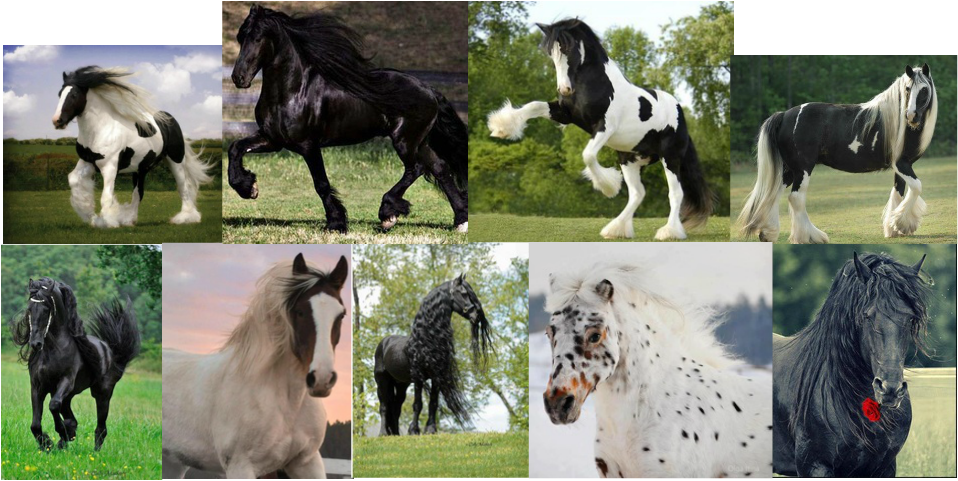- Home
- Site Index
- About Me
-
My Books
- Book List & Themes
- Strictly for Adults Novels >
-
Tales from Portlaw
>
- No Need to Look for Love
- 'The Love Quartet' >
-
The Priest's Calling Card
>
- Chapter One - The Irish Custom
- Chapter Two - Patrick Duffy's Family Background
- Chapter Three - Patrick Duffy Junior's Vocation to Priesthood
- Chapter Four - The first years of the priesthood
- Chapter Five - Father Patrick Duffy in Seattle
- Chapter Six - Father Patrick Duffy, Portlaw Priest
- Chapter Seven - Patrick Duffy Priest Power
- Chapter Eight - Patrick Duffy Groundless Gossip
- Chapter Nine - Monsignor Duffy of Portlaw
- Chapter Ten - The Portlaw Inheritance of Patrick Duffy
- Bigger and Better >
- The Oldest Woman in the World >
-
Sean and Sarah
>
- Chapter 1 - 'Return of the Prodigal Son'
- Chapter 2 - 'The early years of sweet innocence in Portlaw'
- Chapter 3 - 'The Separation'
- Chapter 4 - 'Separation and Betrayal'
- Chapter 5 - 'Portlaw to Manchester'
- Chapter 6 - 'Salford Choices'
- Chapter 7 - 'Life inside Prison'
- Chapter 8 - 'The Aylesbury Pilgrimage'
- Chapter 9 - Sean's interest in stone masonary'
- Chapter 10 - 'Sean's and Tony's Partnership'
- Chapter 11 - 'Return of the Prodigal Son'
- The Alternative Christmas Party >
-
The Life of Liam Lafferty
>
- Chapter One: ' Liam Lafferty is born'
- Chapter Two : 'The Baptism of Liam Lafferty'
- Chapter Three: 'The early years of Liam Lafferty'
- Chapter Four : Early Manhood
- Chapter Five : Ned's Secret Past
- Chapter Six : Courtship and Marriage
- Chapter Seven : Liam and Trish marry
- Chapter Eight : Farley meets Ned
- Chapter Nine : 'Ned comes clean to Farley'
- Chapter Ten : Tragedy hits the family
- Chapter Eleven : The future is brighter
-
The life and times of Joe Walsh
>
- Chapter One : 'The marriage of Margaret Mawd and Thomas Walsh’
- Chapter Two 'The birth of Joe Walsh'
- Chapter Three 'Marriage breakup and betrayal'
- Chapter Four: ' The Walsh family breakup'
- Chapter Five : ' Liverpool Lodgings'
- Chapter Six: ' Settled times are established and tested'
- Chapter Seven : 'Haworth is heaven is a place on earth'
- Chapter Eight: 'Coming out'
- Chapter Nine: Portlaw revenge
- Chapter Ten: ' The murder trial of Paddy Groggy'
- Chapter Eleven: 'New beginnings'
-
The Woman Who Hated Christmas
>
- Chapter One: 'The Christmas Enigma'
- Chapter Two: ' The Breakup of Beth's Family''
- Chapter Three: From Teenager to Adulthood.'
- Chapter Four: 'The Mills of West Yorkshire.'
- Chapter Five: 'Harrison Garner Showdown.'
- Chapter Six : 'The Christmas Dance'
- Chapter Seven : 'The ballot for Shop Steward.'
- Chapter Eight: ' Leaving the Mill'
- Chapter Ten: ' Beth buries her Ghosts'
- Chapter Eleven: Beth and Dermot start off married life in Galway.
- Chapter Twelve: The Twin Tragedy of Christmas, 1992.'
- Chapter Thirteen: 'The Christmas star returns'
- Chapter Fourteen: ' Beth's future in Portlaw'
-
The Last Dance
>
- Chapter One - ‘Nancy Swales becomes the Widow Swales’
- Chapter Two ‘The secret night life of Widow Swales’
- Chapter Three ‘Meeting Richard again’
- Chapter Four ‘Clancy’s Ballroom: March 1961’
- Chapter Five ‘The All Ireland Dancing Rounds’
- Chapter Six ‘James Mountford’
- Chapter Seven ‘The All Ireland Ballroom Latin American Dance Final.’
- Chapter Eight ‘The Final Arrives’
- Chapter Nine: 'Beth in Manchester.'
- 'Two Sisters' >
- Fourteen Days >
-
‘The Postman Always Knocks Twice’
>
- Author's Foreword
- Contents
- Chapter One
- Chapter Two
- Chapter Three
- Chapter Four
- Chapter Five
- Chapter Six
- Chapter Seven
- Chapter Eight
- Chapter Nine
- Chapter Ten
- Chapter Eleven
- Chapter Twelve
- Chapter Thirteen
- Chapter Fourteen
- Chapter Fifteen
- Chapter Sixteen
- Chapter Seventeen
- Chapter Eighteen
- Chapter Nineteen
- Chapter Twenty
- Chapter Twenty-One
- Chapter Twenty-Two
-
Celebrity Contacts
-
Thoughts and Musings
- Bereavement >
- Nature >
-
Bill's Personal Development
>
- What I'd like to be remembered for
- Second Chances
- Roots
- Holidays of Old
- Memorable Moments of Mine
- Cleckheaton Consecration
- Canadian Loves
- Mum's Wisdom
- 'Early life at my Grandparents'
- Family Holidays
- 'Mother /Child Bond'
- Childhood Pain
- The Death of Lady
- 'Soldiering On'
- 'Romantic Holidays'
- 'On the roof'
- Always wear clean shoes
- 'Family Tree'
- The importance of poise
- 'Growing up with grandparents'
- Love & Romance >
- Christian Thoughts, Acts and Words >
- My Wedding
- My Funeral
- Audio Downloads
- My Singing Videos
- Bill's Blog
- Contact Me
Chapter One
'The Early Life of Sean Thornton'
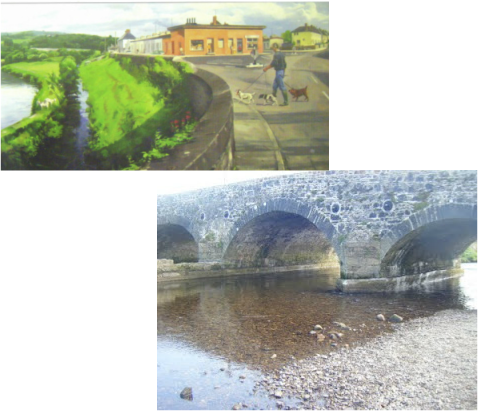
The town of Portlaw has seen much in its lifetime, although this tale is more about its people rather than the place itself. While some doubt still remains in the accounts of Irish historians about the origin of its name, there has never been any question as to its rightful place in the overall history of the Emerald Isle. Portlaw is derived from 'Port' meaning 'Bank' and 'Law' meaning 'Hill' or 'Lach' meaning 'Friendly'. To me it will always be the place where 'the friendly folk on the hill' live and it is wholly appropriate that its church, St Michael's, rests on the corner of the hill brow; thereby enabling the haunting spirits of its proud citizens who have passed away and have been buried in the church's graveyard, to look down on the bridge below that provides entrance and introduction to the town itself.
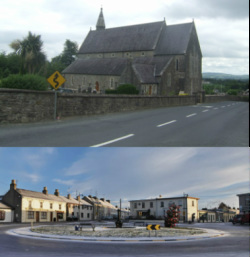
The town of Portlaw has always provided mixed feelings in its inhabitants about living there. For many exiles and emmigrants who no longer live there, Portlaw will always be the place to be! And for some who consider themselves too fine a person to live there, it's the place they want to get out of at the first opportunity! For the vast majority of the people who have ever lived there and, particularly those purest of its people who were born there, it is the place where they choose to be buried! To drink from its waters, to pray in its church on the hill and to meet one's first love on its bridge, represents the the only trinity that many a boy and girl from its town holds true to taste and touch.
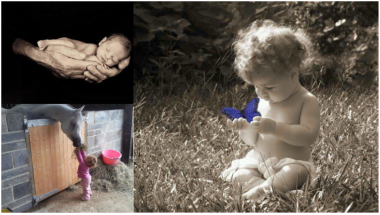
Sean Thornton was born in William Street, Portlaw; number 14 to be precise. He was born into a large family of modest means and because they could not afford to buy beds for all of their family, his home birth occurred upon a mattress that had been placed on the floor of the front room that faced the street itself. From his earliest memories, the butterfly and the horse have always held a place in his heart. In later life, the butterfly became an insignia for his work and he learned that the year of his birth in 1930 was the Chinese year of the Horse.
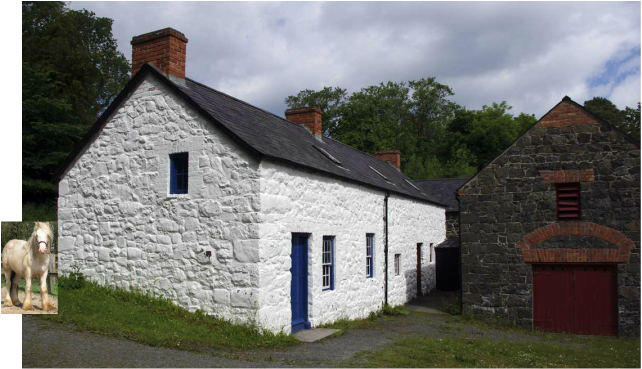
Sean was a bright young man and he fared well at school in Portlaw. Between the ages of ten and fifteen, he would spend every evening either reading or walking along the road towards the fields past the area of Coolfinn Cottages. About half a mile along this road, across two fields and up an overgrown farm track lived a single man in his 50s who bred the finest horses this side of Arabia. His name was Ned Hackett.
Ned's great grandfather had been a shoemaker in Portlaw during the 19th century. Ned Hackett was very protective of his fine horses, so much so, that he had bought an isolated farm in a place where few folk ever walked. His sole purpose was to remain off the beaten track where he could continue to breed and sell his horses without too much interference from the folk of Portlaw. Ned was a canny businessman and a true horse lover. He only sold his stock to the Spanish and the Americans, where he could command the highest prices. You see, he bred his horses for their beauty, to show and to breed new stock from; not to furrow fields, pull carts and ploughs or provide meat for the palates of Donegal folk who were said to prefer the side of a horse to eat instead of the arse of a cow! Ned never had the inclination to marry and the only fillies he ever admired were the four-legged ones, who could always be relied upon to eat from his hand.
Ned's great grandfather had been a shoemaker in Portlaw during the 19th century. Ned Hackett was very protective of his fine horses, so much so, that he had bought an isolated farm in a place where few folk ever walked. His sole purpose was to remain off the beaten track where he could continue to breed and sell his horses without too much interference from the folk of Portlaw. Ned was a canny businessman and a true horse lover. He only sold his stock to the Spanish and the Americans, where he could command the highest prices. You see, he bred his horses for their beauty, to show and to breed new stock from; not to furrow fields, pull carts and ploughs or provide meat for the palates of Donegal folk who were said to prefer the side of a horse to eat instead of the arse of a cow! Ned never had the inclination to marry and the only fillies he ever admired were the four-legged ones, who could always be relied upon to eat from his hand.
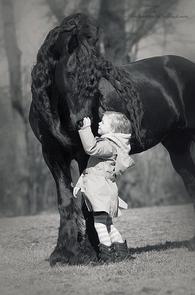
Sean had been only five years old when one day, his father decided the walk off the beaten track with him and they came across Ned Hackett's horse farm. Sean's eyes lit up as soon as he saw this magnificent mare that had been made up for show with its mane pleated. Sean still recalled a time two years earlier, when a farmer from Carrick on Suir had allowed him to give some straw to one of the horses stabled there.
There was no disguising the sheer delight on the face of young Sean when Ned Hackett gave him permission to stroke the nose of the magnificent beast. Sean became a regular visitor to Ned Hackett's place and between the ages of eleven and fifteen, he used to help Ned do the mucking out and help to feed the stock. All that he asked in exchange for his labour was to simply be around these creatures that he loved. Next to royalty, they were the most majestic creatures he had ever seen as they paced and pranced in the fields with the regality of princes on the hoof.
There was no disguising the sheer delight on the face of young Sean when Ned Hackett gave him permission to stroke the nose of the magnificent beast. Sean became a regular visitor to Ned Hackett's place and between the ages of eleven and fifteen, he used to help Ned do the mucking out and help to feed the stock. All that he asked in exchange for his labour was to simply be around these creatures that he loved. Next to royalty, they were the most majestic creatures he had ever seen as they paced and pranced in the fields with the regality of princes on the hoof.
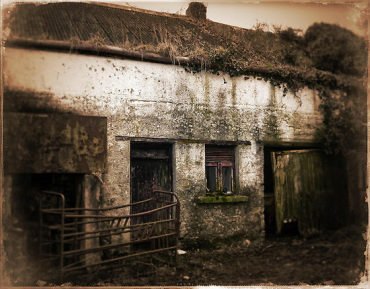
One day during his fifteenth year of age, while at Ned Hackett's place, Ned asked Sean if he would drop a churn of milk off at his neighbour, the Widow Friggs' cottage, two fields across, before he went home. It would seem that the old woman had been a widow for many years and depended on Ned to fetch her daily groceries, especially during recent war years. Between Ned and her God (to whom the widow was said to pray four times daily), old Widow Friggs had no other person to rely on, or rather 'would' rely on. Ned told Sean that the widow had no living relatives and was one of these proud old folk who didn't trust anyone she hadn't known for at least fifty years. He didn't know her age, but merely said that she had always been an old widow lady to him ever since his childhood and that she can't have been far off being a hundred, if a day!
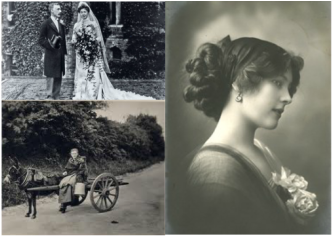
Her husband had died before she had come to live in Portlaw and the only image that Ned had ever seen of him was a wedding photograph that stood by the side of her bed, alongside another two photographs of her. One snap shot was presumably of the widow herself as a young woman. She looked beautiful and appeared very much a society belle. The other was a photograph of the widow driving a donkey and cart along the road to Carrick on Suir. That snap shot was presumably taken after the widow had arrived in Portlaw.
Ned told Sean that when the widow saw his curiosity as he looked at the images instead of doing what he was supposed to be doing (emptying her chamber pot one afternoon), she simply removed the photographs from the his hands and ushered him out of her bedroom without further comment.
Ned told Sean that when the widow saw his curiosity as he looked at the images instead of doing what he was supposed to be doing (emptying her chamber pot one afternoon), she simply removed the photographs from the his hands and ushered him out of her bedroom without further comment.
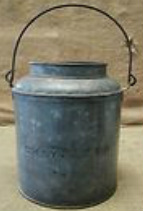
The widow's farm was reportedly older than she was and had no supply of electricity or tap water inside the old property. She was dependent on an old pump in the yard, and when the pump froze up, the nearby stream and the use of a water bucket had to suffice. Ned had offered to get such essential supplies installed for her on a number of occasions, but she had always refused. Ned initially believed that poverty or pride was the reason that led the widow to decline, but then came to learn that it was just sheer suspicion of strangers whom she intensely disliked being on her land. Ned asked Sean to take the urn and to leave it on the widow's doorstep without bothering to try to engage in any conversation with her.
"There's no point knocking, 'cos she won't answer," he advised Sean adding, "and if she happens to poke her face into view, don't bother yourself talking to her 'cos she still won't answer you! She can't bide strangers. Doesn't trust them any more than she trusts the fox not to eat her chickens. While you're there, try and snatch a view from the back of her old place. It's the best view in Waterford; even if I do say so myself!"
"There's no point knocking, 'cos she won't answer," he advised Sean adding, "and if she happens to poke her face into view, don't bother yourself talking to her 'cos she still won't answer you! She can't bide strangers. Doesn't trust them any more than she trusts the fox not to eat her chickens. While you're there, try and snatch a view from the back of her old place. It's the best view in Waterford; even if I do say so myself!"
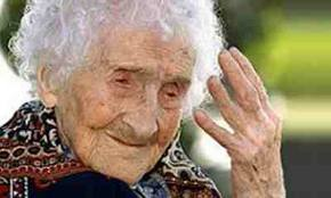
Sean took the milk churn and delivered it as requested. The old woman heard someone approach and popped her head round the partly opened door. Her head was shaped like that of a Greek scholar and seemed to be wrapped in a cloak of white wisdom. She silently beckoned him to put the milk churn down at the door entrance to the cottage. Ned Hackett had already warned him that the widow was a woman of few words and would always communicate her wish by gesture if the spoken word could be avoided. Sean could make out a few large warts on the old woman's neck. Her overall complexion of darker skin made her look weathered from living in the country all of her life and was filled with creases and wrinkles, like that of a turkey's neck.
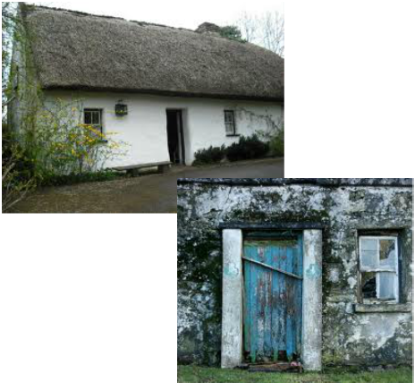
Sean left Widow Frigg's dilapidated cottage that day and didn't have occasion to go there again for the next ten years. In fact, he would be 25 years old when he next visited the widow's place.
When Sean next saw Ned Hackett, the horse breeder thanked him for having delivered the milk churn to the widow's cottage. Then he got out an old photo album that he kept and showed Sean two photographs; one creased and obviously taken many years ago, and the other, a snap shot taken more recently.
"Take a look at these photos, my Boyo," Ned Hackett said to Sean. "This one is of the Widow Frigg's cottage when I was a boy of fifteen...........and I took that one the last time I tried to fix her back door about two months ago and replace two broken window frames. I even had to prop up the door lintel to stop the whole lot falling down! You wouldn't believe it, would you? It's a toss-up which will fall down first; her or the old house!"
The two photographs shown to Sean revealed how run down the widow had let her home dwelling become since she had grown older.
When Sean next saw Ned Hackett, the horse breeder thanked him for having delivered the milk churn to the widow's cottage. Then he got out an old photo album that he kept and showed Sean two photographs; one creased and obviously taken many years ago, and the other, a snap shot taken more recently.
"Take a look at these photos, my Boyo," Ned Hackett said to Sean. "This one is of the Widow Frigg's cottage when I was a boy of fifteen...........and I took that one the last time I tried to fix her back door about two months ago and replace two broken window frames. I even had to prop up the door lintel to stop the whole lot falling down! You wouldn't believe it, would you? It's a toss-up which will fall down first; her or the old house!"
The two photographs shown to Sean revealed how run down the widow had let her home dwelling become since she had grown older.
|
Click here for the next page
|
Click here for the previous page
|
